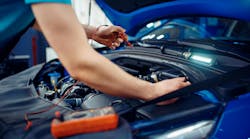Niagara County, in New York state, hired a consulting firm last week to perform a study of how feasible it would be to convert the county's vehicle fleet to alternative fuels.
Blue Springs Energy, of Webster, was chosen for the $7,500 study, approved by two County Legislature committees last week, of how far the county could go in using electric vehicles or those that run on compressed natural gas.
Blue Springs CEO Larry Simpson said his firm has completed similar reports for Rockland and Ontario counties, as well as other local governments and private companies.
"They're going to do a good, complete study," Public Works Commissioner Kevin P. O'Brien said. He expects the report in about 60 days.
At present, compressed natural gas is selling for about $1.50 per gallon, while gasoline and diesel approach $4 per gallon, Simpson said. But there's more to explore than the simple price differential.
"What would the cost of infrastructure be?" Simpson asked. The county would need a compressed natural gas filling station, and for lack of private-sector alternatives in the county, it would have to construct one of its own.
"There are a number of companies out there that would put up the capital for a fueling station," Simpson said. In return, such firms would seek a long-term fuel supply agreement.
The cost of constructing such a facility would range from $200,000 to $2 million, depending on the number and type of pumps, Simpson said.
The county would have to choose a particular combination of "fast-fill" pumps, which work like typical gasoline pumps and require powerful compressors, and "time-fill" pumps, which are meant to fill vehicle tanks overnight. They can use slower, less expensive compressors.
Besides the possibility of a deal with a fuel company, Simpson said there are about $3 billion worth of grants available from the federal and state governments and utility companies for alternative fuel-related purchases.
There are also modification kits available that would fuel a vehicle through a building's existing natural gas service line. These cost about $5,000 apiece now, although companies are working on less expensive versions, Simpson said.
O'Brien said the County Attorney's Office had approved possible use of the county's annual cash payment from the New York Power Authority toward the costs of the conversion.
One of the question marks is which county vehicles could be retrofitted to run on compressed natural gas, and how much that would cost.
Safety equipment is a must, too.
"When you have compressed natural gas," O'Brien said, "you have to have spark arresters on every light and every light fixture."
Simpson said he's not aware of any fatalities resulting from an explosion in a crash of a vehicle running on compressed natural gas, but there have been a few in maintenance settings.
"If you spill gasoline, it goes on the floor," Simpson said. "Natural gas goes the other way, so you have some building codes you have to comply with."
Simpson said it's possible to run large vehicles on compressed natural gas, noting that many mass transit agencies have been purchasing buses that run on the alternative fuel.
"Ford and Chevy have light-duty trucks that take compressed natural gas," he said. As for cars, Honda's compressed natural gas-powered GSX model is available for purchase through state contracts.
"They're also looking at electric vehicles and hybrids as part of the study," Simpson said.
As far back as 2003, the county received five electric cars through a federal grant, but they were close to useless. Then-County Manager Gregory D. Lewis prohibited them from being taken off county property and from being driven at night or in bad weather. He also warned anyone who used them that they might earn traffic citations for impeding traffic by driving too slowly.
Since then, the electric car situation has been revolutionized through hybrids and plug-in models from the major automakers.
The Niagara County Sheriff's Office ran patrol cars on liquid propane two decades ago, but Sheriff James R. Voutour said it switched back to gasoline in the mid-1990s because propane wasn't cost-effective.
He said he came within minutes of signing a deal with a supplier last year to modify his department's vehicles to run on a mixture of propane and gasoline, but only because he had been assured the modification would be free to the county.
Voutour said that at the last minute, the deceptive salesman, who had made his pitch at a state law enforcement convention, revealed that the county actually would have to pay $70,000.
"We threw him out of the office," Voutour said.
Despite that experience, Voutour said he would be open to anything that might save money. But he warned of some practical issues.
Compressed natural gas tanks take up a lot of room in the truck of a car, and Voutour said, "Our trunks are full of equipment, radio equipment, rifles, AEDs [automatic electric defibrillators]."
Budget Director Daniel R. Huntington said the county is projected to spend $913,000 on gasoline and diesel fuel for its vehicles this year, and the tentative 2013 budget envisions a 4 percent increase, to $951,000.
The county is halting its arrangement to supply gasoline to the City of Lockport's vehicles, which involved the purchase and resale of another $250,000 in fuel this year, Huntington added.
The county had to shut down its own gasoline pumps because of environmental problems relating to a fuel leak, so the county buys gasoline from Noco Energy, Huntington said.
The supply line from the 12,000-gallon underground tank to the pumps sprang a leak in 2007, and last year, the state Department of Environmental Conservation ordered the county to remove the tank, a $200,000 project.
The county's diesel pumps are still functioning, Huntington said.

